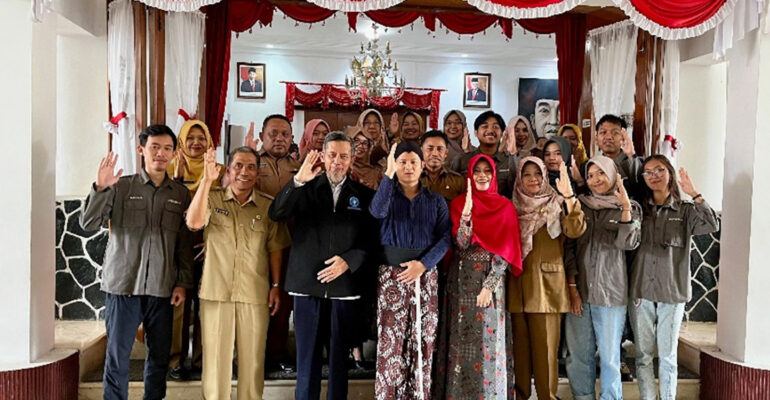IPB University’s Silviculture Department and Trenggalek Regency Government Collaborate on AgroForStain Program

The Department of Silviculture, Faculty of Forestry and Environment (Fahutan) IPB University in collaboration with the District Government (Pemkab) of Trenggalek, East Java developed the Agroforestry for Sustainability (AgroForStain) program. The program is a strategic initiative to develop a sustainable ecosystem in the Trenggalek area.
The program is supported by funding from the Ministry of Education, Culture, Research and Technology (Kemendikbudristek) through the 2024 Kedaireka Match Fund program scheme.
One of the team representatives from IPB University, Prof Nurheni Wijayanto, explained that the AgroForStain program focuses on developing a sustainable agroforestry system on critical land in Trenggalek Regency. The program is carried out through the implementation of drone seeding technology based on AgroFor-SocioTech and carbon footprint to accelerate the recovery of forest ecosystems and critical land.
She who is a lecturer at IPB University also said, AgroForStain is a series of efforts made to support the commitment of Trenggalek Regency in overcoming climate change. Not only that, the program also seeks to support the achievement of sustainable cities and communities through the implementation of strengthening the vegetation diversity database.
“Through this program, we also measure carbon footprint, estimate carbon sequestration, and implement drone seeding based on sustainable AgroFor-SocioTech,” said Prof Nurheni.
She explained that this program was carried out from August to November 2024. The IPB University lecturer team consists of Prof Nurheni Wijayanto, Prof Iskandar Z Siregar, Prof Ulfah J Siregar, Prof Prijanto Pamoengkas, Dr Irdika Mansur, and Dr Adisti PP Hartoyo.
Prof Nurheni continued, there are at least five excellent activities in this program. These superior activities include 1) mapping of forest and land cover, 2) inventory of vegetation, carbon footprint, and carbon sequestration, 3) study of community perceptions and preferences, 4) low-carbon community training, and 5) application of drone seedling technology, miko-seedcookies and seedbombs in ecosystem restoration. The program also involved five students for the implementation of the Freedom of Learning – Independence Campus (MBKM) internship.
The Regent of Trenggalek, Mochamad Nur Arifin, appreciated this collaboration and emphasized the importance of maintaining harmony between environmental preservation and improving the economic welfare of the community. He emphasized that his party is working towards the goal of making Trenggalek a ‘Net Zero Carbon City’ by 2045, with forestry as the main pillar.
“We have pro-environment policies, such as Adiwiyata Village, and Critical Land Rehabilitation which are expected to increase public awareness, improve ecosystems and prevent forest encroachment in the future,” said Mochamad Nur Arifin.
He hopes that through this synergy, the AgroForStain program is expected to bring positive impacts, both for the environment, local government, and the welfare of the people of Trenggalek Regency. (*/ra) (IAAS/ZQA)



